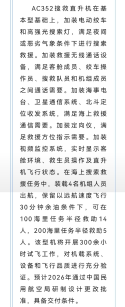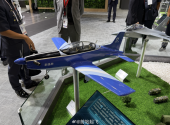You are using an out of date browser. It may not display this or other websites correctly.
You should upgrade or use an alternative browser.
You should upgrade or use an alternative browser.
Chinese Aviation Industry
- Thread starter FriedRiceNSpice
- Start date
AC352 Helicopter Engine WZ-16 co-developed by Safran and AECC Harbin. Engine successfully got certification and entered in production.Nobody likes to share their critical technology, not even China. So its normal for France to be reluctant doing so. Since once you do, you lose control of that. Anyway, at least the project still went through despite the huge delays. Remains to be seen how much tech transfer was eventually made.
this new prototype have core components and subsystem are locally sourced. this is why program delayed coz of localization long process and civil certification.
After several months, some more of the airborne wind turbine reported previously (video below):China's home-designed megawatt-scale commercial buoyant airborne turbine, the S1500, has successfully completed its maiden flight in northwest China's Hami after passing tests including full desert assembly and continuous high-wind deployment and retrieval.
At 60 meters long, 40 meters wide and 40 meters tall, it is by far the largest floating wind-power generator ever built, with the main airfoil and annular wing together forming a giant duct that houses 12 turbine-generator sets, each rated at 100 kW. Its rotors can harness the steady high-altitude jet stream and convert wind into electricity, which is then transmitted reliably to the ground through the tether cable.
View attachment 161394View attachment 161395
Measuring about 13 stories high (as previously reported, diameter of ~40 meters, length ~60 meters), the S2000 floating wind turbine can generate over one megawatt per hour. The helium-filled turbine was developed in Yunnan by Linyi Yunchuan (临一云川) Energy Technology Co., Ltd.
A clear advantage of floating turbines is variable altitude, as well as having access to much higher-velocity and more regular winds at overall higher altitudes than can be reached by fixed stations. Downsides include difficulty of maintenance, however what kind of maintenance is required and how susceptible they are to damage is highly dependant on the type of turbine deployed. This kind is only one of dozens of designs currently being researched, and I am truly eager to see which designs ultimately become most popular.
As far as the different designs I have seen up to now, I am a fan. The video says the company has entered small batch production and commercialization, showing progress from last year's test flight. According to the program chief engineer, Weng Hanke (翁翰钶), return on investment is approaching that of traditional turbines. Costs are likely still higher because they have not yet realized economies of scale.
Most exciting, he goes on to say that in the future Linyi Yunchuan plans to build even bigger versions with greater power generating potential, that will push the cost-per-killowatt down even further.
Last edited:
The world's first hybrid-power cargo, Caihong-YH1000S, successfully completed its maiden flight on Sunday in southwest China's Chongqing.
Equipped with a high-power hybrid powertrain jointly developed by the drone manufacturer and a new-energy vehicle carmaker, the drone features shorter takeoff and landing distances, along with enhanced payload capacity and flight range.
The large cargo drone is intended for missions including international logistics, emergency rescue, artificial weather modification, and maritime monitoring.
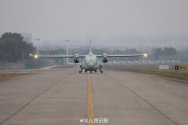
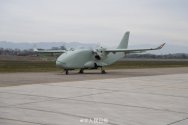
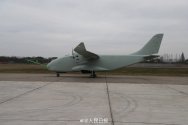
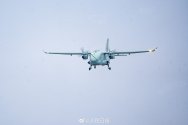
Equipped with a high-power hybrid powertrain jointly developed by the drone manufacturer and a new-energy vehicle carmaker, the drone features shorter takeoff and landing distances, along with enhanced payload capacity and flight range.
The large cargo drone is intended for missions including international logistics, emergency rescue, artificial weather modification, and maritime monitoring.




Nice video of the test flight:The world's first hybrid-power cargo, Caihong-YH1000S, successfully completed its maiden flight on Sunday in southwest China's Chongqing.
Equipped with a high-power hybrid powertrain jointly developed by the drone manufacturer and a new-energy vehicle carmaker, the drone features shorter takeoff and landing distances, along with enhanced payload capacity and flight range.
The large cargo drone is intended for missions including international logistics, emergency rescue, artificial weather modification, and maritime monitoring.
View attachment 169082View attachment 169083View attachment 169084View attachment 169085
And 央视军事coverage on bilibili:
Last edited:

